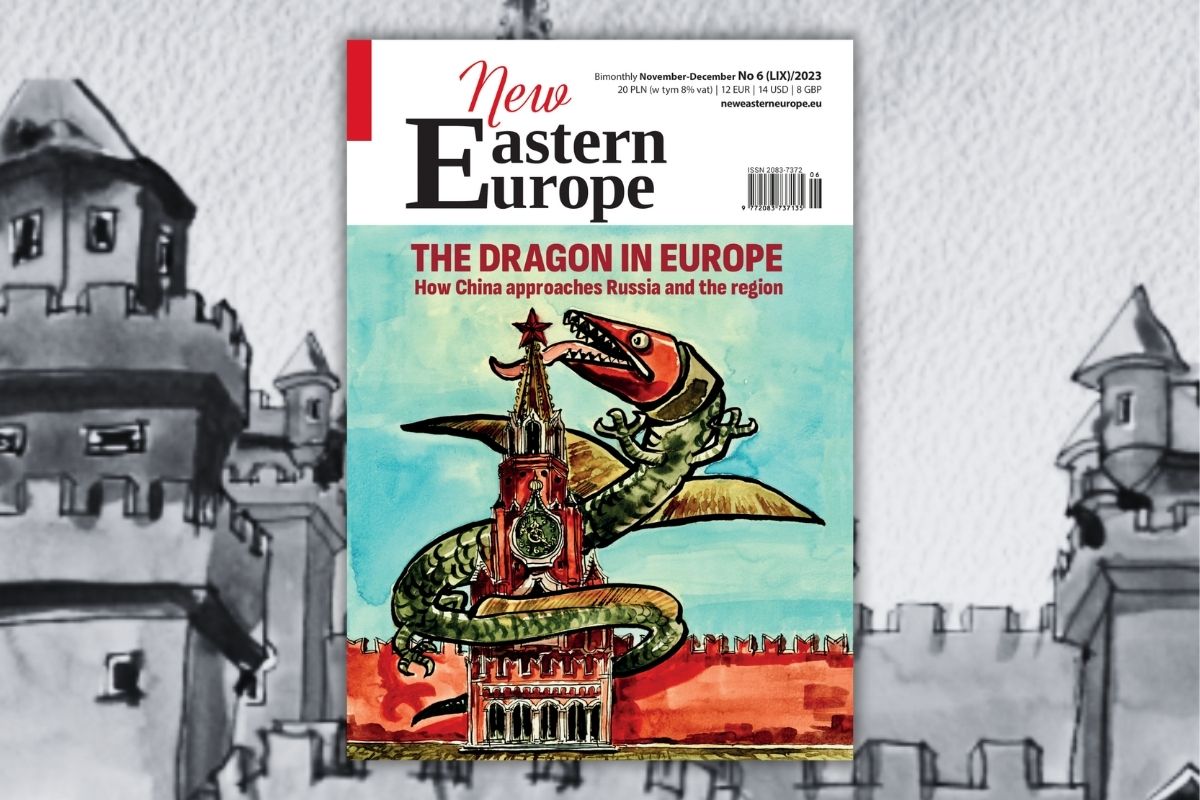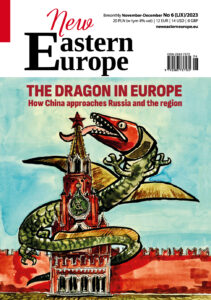Issue 6/2023: The Dragon in Europe
Now available – the latest issue of New Eastern Europe: On how China approaches Russia and the region.
November 20, 2023 -
New Eastern Europe
-
Issue 6 2023Magazine

![]()
Click here to subscribe and get access to this issue plus all previous issues
To purchase a single copy of the issue click here
This year, on September 13th and 14th, China hosted a summit in Hong Kong dedicated to the ten-year anniversary of the Belt and Road Initiative. Notably, among the guests of honour invited to this event was Vladimir Putin, whom the Chinese leader Xi Jinping presented as a “dear friend”. This gesture is one of many examples of the growing cooperation between Russia and China, which we have seen since even before the start of Russia’s full-scale invasion of Ukraine.
 That is why for this issue of New Eastern Europe, we asked our authors to look at China’s role in the region. They analysed the various aspects of the Sino-Russian axis trying to understand whether it is driven by convenience or a deeper connection between the two powers. In addition, they also looked at China’s presence in Central and Eastern Europe, and especially the 17+1 format which was initially met with some enthusiasm, especially among the more authoritarian politicians. However, the initial support for this format has somewhat waned recently. This shift, especially in Czechia and Lithuania, can be explained by a change of attitude to China’s policy towards Taiwan, the human rights’ violations towards the Uyghur population and China’s ambiguous position in the current conflict in Ukraine.
That is why for this issue of New Eastern Europe, we asked our authors to look at China’s role in the region. They analysed the various aspects of the Sino-Russian axis trying to understand whether it is driven by convenience or a deeper connection between the two powers. In addition, they also looked at China’s presence in Central and Eastern Europe, and especially the 17+1 format which was initially met with some enthusiasm, especially among the more authoritarian politicians. However, the initial support for this format has somewhat waned recently. This shift, especially in Czechia and Lithuania, can be explained by a change of attitude to China’s policy towards Taiwan, the human rights’ violations towards the Uyghur population and China’s ambiguous position in the current conflict in Ukraine.
In addition to the China-focused bloc we encourage you to read the texts that cover the developments that have also been observed in the region but are less often addressed by the mainstream media. In particular, with the ongoing migration waves, be it from the Middle East or the war-affected Ukraine, our authors analyse different social reactions (in Poland and Romania) to ethnic Ukrainian migrants and those who are Muslim or from the Roma community. The lengthy war also requires that we discuss the role of the Russian society, its responsibility and sense of guilt, for the atrocities committed against the Ukrainian people and on the territory of Ukraine. We chose to address all these difficult and painful issues to stimulate discussions on the challenges that are continuing to emerge and which may determine the future condition of the social reality in Europe and beyond.
Table of Contents
The Dragon in Europe
Between “Trojan horses” and an “Anti-China Vanguard”? Emilian Kavalski
China and Russia A strategic partnership with many limits Alexander Lanoszka
Leading a rethink of China’s Belt and Road Initiative Jens Bastian
The Sino-Baltic dynamic in the age of Sino-Russian synergy Una Aleksandra Bērziņa-Čerenkova
The Russian-Chinese asymmetry A conversation with Michał Lubina
China’s role as a pro-Russian mediator in ending the Russia-Ukraine war Arsen Martyshchuk
A mountain of controversies leaves Czech-China relations with little room for progress Veronika Blablová
Hazards to Georgia’s foreign policy. A strategic partnership with China? Nino Lezhava
Curbing China’s sway in Eastern Europe Vladyslav Faraponov
Essays and Analysis
A treatise on guilt Joshua R. Kroeker
A common red line? Limits of European engagement in Russia’s war against Ukraine Christos Katsioulis
From Kyiv to Korea. How the shockwaves of war reverberated across Eurasia Anthony Rinna
Zelenskyy’s formula for peace Anton Naichuk
Ukrainians’ complicated embrace of NATO Oleksii Lionchuk
Off-SHORe politics. How Gagauzia was sold to a pro-Russian oligarch Irina Percemli
Doom and gloom for Georgia’s EU candidacy? Soso Dzamukashvili
Mapping scenarios for Belarus Stefano Braghiroli And Andrey Makarychev
Stories and ideas
Roma refugees from Ukraine face additional adversity Madeleine Cuckson
Fear of Russian drones creates anxiety in Romanian villages Vlad Iaviță
A story about the Elbe. A story about Europe Jan Šícha
Art, culture and society
A forgotten tale of violence from Romania’s recent past JP O’ Malley
Migrants on the border (of the Polish imagination) Piotr Augustyniak
History and Memory
The need for decolonisation Anton Saifullayeu

































